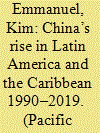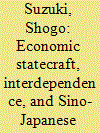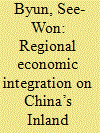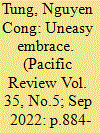|
|
|
Sort Order |
|
|
|
Items / Page
|
|
|
|
|
|
|
| Srl | Item |
| 1 |
ID:
189251


|
|
|
|
|
| Summary/Abstract |
Japan-South Korea relations have consistently been presented by International Relations scholars as a puzzle that confounds mainstream rationalist theories, which struggle to explain the consistent acrimony associated with the so-called ‘history problem’. While many scholars have, therefore, adopted conventional constructivist approaches to incorporate history into their analyses, such literature often neglects the processes of (re)construction of this social reality, thereby implicitly treating these negative sentiments as essentialised elements of Korean and Japanese culture/identity which cause certain foreign policies. Using the recent Japan-South Korea trade dispute as a case study, this article instead draws on critical constructivist/poststructuralist theory and discourse analytical methods to examine how the ‘history problem’ is produced and reproduced. It argues that dominant discourses of remembering in South Korea, which represent Japan as an unrepentant colonial aggressor, and of forgetting in Japan, which represent South Korea as emotional and irrational for dwelling on the past, act to (re)produce identities that clash in their attitudes to difficult history. While such foreign policy practices (re)produce dominant national identities, these identities also shape the bounds of which foreign policies are legitimate or imaginable. This mutually constitutive relationship between identity and foreign policy continually reproduces the ‘history problem’ in Japan-South Korea relations.
|
|
|
|
|
|
|
|
|
|
|
|
|
|
|
|
| 2 |
ID:
189256


|
|
|
|
|
| Summary/Abstract |
To date, perceptions of China's rise in relation to US hegemony in the international realm has not escaped scholarly scrutiny. For the period 1990–2019, the International Relations literature has made a somewhat copious contribution to the broader debates on the US and China. Within the Sino-Latin America Caribbean (LAC) discourse, the implications of China's ascent for US interests in the region is an underlying concern. The region is considered salient in broader power configurations as a result of its geostrategic positioning in relation to the US. However, perceptions pertaining to the triad of interests in the space account largely for powerful states in the dynamic. Despite the ambiguous perceptions associated with a rising China in the international realm and the Latin America Caribbean region's strategic position, rather than being preoccupied with ideas of the ‘China threat’, these states appear to have largely bypassed the more threatening rhetoric associated with China's rise in the period under scrutiny. In seeking to bring Latin America and Caribbean states into the discourse, the article examines how benign perceptions shaped the region's relationship with China. The argument is made that Latin America and Caribbean states sought to frame and navigate their relationship with China largely on the premise of economic opportunity amidst a firmly embedded US role inside the region which further repudiated ideas of the ‘China threat’ in the engagement. In unpacking the argument, the discussion seeks to show that more favourable images of China's economic ascent punctuated LAC states responses to China and that such states have been driven by a high level of economic pragmatism in the relationship. It also illustrates that the underlying hegemonic order has practical effects and more subtle manifestations inside LAC states which mitigated against perceptions of threat in China's rise in the region.
|
|
|
|
|
|
|
|
|
|
|
|
|
|
|
|
| 3 |
ID:
189252


|
|
|
|
|
| Summary/Abstract |
This paper is the first academic attempt to critically bridge the politics of sustainability fix with social conflict theory (SCT) focusing on Indonesia’s foreign-sponsored development of Ultra Supercritical (USC) coal power plants. I examine the contradictory development of ‘green’ projects in Indonesia and specifically unpack: how transnational politico-economic forces have secured a stable sustainability fix for the USC and how they have tamed opposition forces and reshaped governance strategies for intensified accumulation. I attempt to empirically demonstrate how such process unfold through two case studies – Cirebon II developed by Japanese and Korean companies and the Java 7 project funded by China. Albeit each have different alliance formations and strategies, both cases demonstrate that the safeguarding of stable conditions for sustainability fixes of USC power plant development is primarily determined by contestation, conflicts, and compromises between socio-political forces – international fractions of capital, state apparatuses, Indonesia’s PLN and coal oligarchy as well as broader civil society actors. They reshape governing strategies that are ultimately organised through the Indonesian state and react to the selectivity of state strategies which privilege dominant forces. The paper contributes to the existing literature on the political economy of infrastructure and serves to take state transformation into account and to dispel the ‘methodological nationalism’ view that presupposes policy outcome and institutional features are inherent to the mode of capitalism of the investor’s country of origin.
|
|
|
|
|
|
|
|
|
|
|
|
|
|
|
|
| 4 |
ID:
189257


|
|
|
|
|
| Summary/Abstract |
China’s increasingly active economic diplomacy in recent years has often been deeply linked to its geostrategic interests. Japan is said to be watching this development with alarm. Analysts have often claimed that this has resulted in Sino-Japanese rivalry, where the Japanese see any gains made by China in zero-sum terms, and make concerted efforts to counter China’s growing influence. This article, however, is critical of such views. While elements of rivalry may indeed be visible in some aspects of Sino-Japanese relations, it would be premature to apply this perspective to economic statecraft, which is inherently multifaceted. This article claims that too much attention has been paid to the strategic aspects of Chinese economic statecraft at the expense of economic/commercial ones that could foster cooperative relations between Beijing and Tokyo. It argues that Japan does not hold a monolithic view that Chinese diplomatic activities in the economic realm are an axiomatic threat to Japanese security interests, and it remains premature to say that Japan and China are ‘rivals’ in the realm of economic statecraft. Future analysis in this area needs to pay greater attention to the complicating effects that economic interdependence can have in strategic policies.
|
|
|
|
|
|
|
|
|
|
|
|
|
|
|
|
| 5 |
ID:
189255


|
|
|
|
|
| Summary/Abstract |
Why has China’s economic integration with Asia lagged in the northeast despite high expectations since the 1990s? China-centered integration in Asia is best understood at the Chinese subnational level. The interaction of central, local, and international interests under given structural and historical conditions produces distinct provincial trajectories of foreign economic engagement. While central state interests dictate policy choice under authoritarian rule, policy outcomes are shaped through local feedback effects and institutional innovations to manage transnational exchange. The Jilin-Northeast Asia case over the past two decades shows a negative orientation of such dynamics, stemming from a poor alignment of interests, the region’s structural constraints, and a socialist historical legacy. By tracing change and continuity on China’s late-developing, inland periphery, this study points to the subnational dimensions of cross-border integration obscured by conventional international relations scholarship, and presents the other side of China’s coastal success story. China’s ongoing plans for Asian integration are linked to the long-term development of China’s own regions rather than just aspirations abroad.
|
|
|
|
|
|
|
|
|
|
|
|
|
|
|
|
| 6 |
ID:
189254


|
|
|
|
|
| Summary/Abstract |
Like many other small and middle powers, Vietnam is facing a strategic dilemma in the face of the U.S.-China rivalry. With the introduction of a vision for Free and Open Indo-Pacific (FOIP), the US seeks to strengthen ties with its allies and partners in the region to preserve rules-based international order and to counter China’s rise. Being positioned as the U.S. burgeoning like-minded partner in the regional security architecture, how Vietnam responds to the FOIP strategy, hence, merits consideration. This article argues that Vietnam has responded positively toward the FOIP strategy due to the high compatibility between some key tenets of this strategy and its national interests. However, rather than joining and supporting FOIP in a full-fledged way, Vietnam has chosen to work selectively in some issues with the US. More specifically, while Vietnam proactively embraces the economic dimension in FOIP, it still remains cautious about the security domain. The rationale behind Vietnam’s hesitation to lend full support to this strategy is partially driven by China factor. In this article, China is addressed as a “brake,” which can exert influence on the speed and scope of cooperation that Vietnam is willing to move forward with the US under FOIP strategy.
|
|
|
|
|
|
|
|
|
|
|
|
|
|
|
|
| 7 |
ID:
189253


|
|
|
|
|
| Summary/Abstract |
This article analyses wedge strategies in the context of Russo-Japanese relations. In particular, it looks at how both countries have sought to generate a dis-alignment in the opposing side, preventing further steps toward the consolidation of potentially threatening partnerships: the US-Japan alliance for Russia, and the Russia-China entente for Japan. After identifying the respective goals of Russia and Japan, the article examines the conditions that enable the success of wedge strategies. Looking at the case of Russia-Japan relations from 2012 to 2020, the article argues that a strategy constituted of a mix of positive economic and political incentives and a limited amount of coercion can succeed in producing a degree of dis-alignment in the opposing camp. Russia’s strategy seems to be more productive than Japan’s since Moscow has managed to minimize the effect of sanctions imposed by Japan and it has reduced political differences to mostly bilateral and regional issues. A greater level of cooperation with established partners for both Russia and Japan, and limited costs of wedging strategies, have resulted in dis-alignment but not a reversal of existing alignments. The article also indicates that in this case credibility issues do not fundamentally affect the degree of success of wedge strategies.
|
|
|
|
|
|
|
|
|
|
|
|
|
|
|
|
|
|
|
|
|